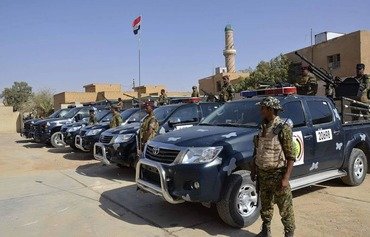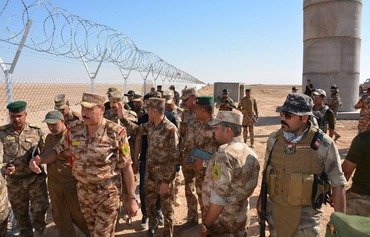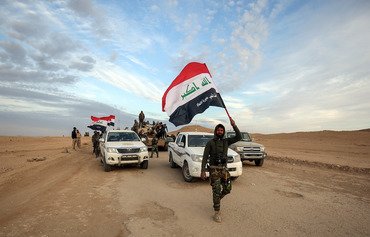The Iraqi government has put in place a series of strict security measures to prevent "Islamic State of Iraq and the Levant" (ISIL) elements from returning to Fallujah, Iraqi officials tell Diyaruna.
These include fortifications on the ground, such as digging a trench around the city to curb terrorist infiltration, as well as new administrative procedures, such as handing out security forms to city residents, they said.
The government initiated these measures one month after Iraqi forces liberated the Anbar province city from ISIL on June 26th.
A trench, which is one metre deep and 1.5 metres wide, is being dug on two sides of the city, Fallujah police chief Col. Jamal al-Jumaili told Diyaruna.
A five-kilometre trench is being dug along Fallujah's northern perimeter, he said, and a four-kilometre trench to the south.
The western side is protected by the Euphrates River, which forms a natural border, he said, while the international highway, and all the security checkpoints along it, stretches along the eastern side, making both difficult to penetrate.
The northern trench, which is on track to be completed in the next few days, also will serve as a separating line between the sectors of operation of the army's 1st and 14th divisions, he said.
The southern trench is an old one which was dug out in 2013, before the city fell into ISIL's hands, he added, but work is under way to excavate and expand it.
The trench will prevent ISIL elements from sneaking back into the city, provide additional protection to the population, and fend off ISIL's threats, he said.
It will not be an obstacle to the movement of local residents and farmers, who will be able to enter and leave the city via two main entrances, he said, noting that two other entrances will be opened later when security conditions improve.
Electronic security forms
Fallujah's local administration has introduced new administrative measures to maintain control of the city's security following its liberation and in preparation for the return of displaced residents.
Displaced residents will be obliged to fill out electronic security forms before returning to their city, Fallujah mayor Issa al-Issawi told Diyaruna.
The form will assign each returning family a code number, he said, making it easy for security services in the district to quickly access the family's basic information and security background.
The information on these forms will be entered into a database, he added, and will later be used in the issuance of identity cards and for vehicle registration.
The form requires the name and occupation of the head of household, the address of residence in Fallujah, and the address where the family resided during their displacement, as well as any associated ID card numbers.
The form also asks whether the head of household has any relatives affiliated with terrorist organisations and what their names are, and asks if he has relatives residing outside Iraq.
Blocking extremist ideology
The new trench will curb the infiltration of terrorists, said Sheikh Faisal al-Assafi, head of the tribal mobilisation against ISIL in Anbar.
"We have a problem, and if it was in our hands, we would build a wall to isolate innocent civilians from extremist terrorist groups in Fallujah and in other cities threatened by terrorism," he told Diyaruna.
Al-Assafi called for precautionary security measures in Fallujah to extend to fighting the extremist ideologies nurtured and fueled by groups such as ISIL.
ISIL elements have been using Fallujah mosques as a platform for recruiting young people and pushing them towards extremism and terrorism, he said.
Iraq must work to spread a spirit of tolerance and to ensure mosque pulpits are not co-opted by extremist groups that seek to manipulate young people's minds, he added.
Fallujah poses a great security challenge to the Iraqi government, he said, due to the infiltration of extremists and their ability to dictate public opinion.
Fallujah was the first city to fall into the hands of ISIL, he said, adding that the group turned it into a manufacturing centre for car bombs, rockets and improvised explosive devices (IEDs).
Meanwhile, he added, its residents were thrown in the group's prisons or forced to flee for neighbouring provinces.

![The Iraqi government is digging a trench like this one, between Karbala and Anbar, around parts of Fallujah to fortify the city against terrorist infiltration. [Photo courtesy of the Iraqi Ministry of Defence]](/cnmi_di/images/2016/08/11/5982-Iraq-karbala-trench-600_384.jpg)






